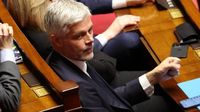In a bold and controversial proposal, Laurent Wauquiez, the leader of the Republicans in France, has suggested that dangerous foreigners under an obligation to leave the territory (OQTF) should be detained in a center located in Saint-Pierre-et-Miquelon, a small French archipelago situated off the coast of Canada. This proposal, which Wauquiez unveiled in an interview with JDNews on April 8, 2025, has sparked significant backlash from various political figures and local leaders.
Wauquiez's remarks come amid ongoing debates surrounding immigration policies in France. He stated, "I propose that dangerous foreigners under OQTF be locked up in a retention center in Saint-Pierre-et-Miquelon, outside of mainland France." He elaborated that individuals in this situation would have only one alternative: either go to Saint-Pierre-et-Miquelon or return to their home country. Those who refuse to return would be offered a one-way ticket to the island, without any return flight to Europe.
Saint-Pierre-et-Miquelon, which is not part of the Schengen Area, presents a unique case for such a proposal. Wauquiez noted that the archipelago experiences harsh weather conditions, with an average temperature of 5 degrees Celsius and 146 days of rain and snow each year. He suggested that these conditions would serve as a deterrent, saying, "I think that quite quickly, it will make everyone think." This approach aims to address what Wauquiez described as the "absolute symbol of our impotence" regarding unexecuted OQTFs.
The proposal has drawn sharp criticism from various quarters. Stéphane Lenormand, a member of the French National Assembly representing Saint-Pierre-et-Miquelon, called Wauquiez's comments "completely absurd, contemptuous of the populations and the territory, and unfeasible." He expressed his outrage during a live Twitch broadcast, asserting, "We are not the garbage dump of France!" Lenormand's remarks resonate with the sentiments of many locals who feel that the archipelago should not be treated as a dumping ground for individuals deemed undesirable by the French government.
Moreover, Manuel Valls, the Minister of Overseas France, condemned Wauquiez's proposal, stating, "Saint-Pierre-et-Miquelon is France, not a prison or a detention center." He emphasized that no French territory deserves to be treated as a place of relegation, likening the idea of forced exile to colonial practices. Valls added, "The forced exile is a method of a colonizer, not of an elected representative of the Republic. The penal colony of Cayenne is far away, and thank goodness for that."
Marine Le Pen, leader of the National Rally party, also voiced her disapproval on social media, asserting that the place for OQTF individuals is in their own country, not in a French territory. She emphasized, "The inhabitants of Saint-Pierre-et-Miquelon are not second-class citizens!" Le Pen's comments reflect a broader concern about the implications of Wauquiez's proposal for the rights and dignity of residents in the archipelago.
Critics have also pointed out the logistical challenges associated with Wauquiez's plan. Lenormand highlighted that transporting individuals under OQTF from the mainland to Saint-Pierre-et-Miquelon would require significant resources and infrastructure that do not currently exist. He remarked, "It would mean that some of the most dangerous OQTF individuals would transit through Canada; we do not have the logistics for that." This raises questions about the feasibility of implementing such a policy.
The proposal is not entirely new; it echoes previous suggestions made by other political figures. In 2021, Éric Ciotti proposed the creation of a "Guantanamo à la française" to detain extremely dangerous individuals in a dedicated retention center. Wauquiez's recent comments have reignited discussions around immigration and detention policies in France, with some supporters framing it as a necessary measure to enhance national security.
Geoffroy Didier, a member of Wauquiez's campaign team, defended the proposal, describing it as a "muscular measure that has the merit of being dissuasive and effective." He argued that such policies are necessary in light of the government's perceived failures in managing immigration. However, this perspective has not gained universal support within the party, and some members have expressed concern that such proposals may alienate moderate voters.
As the debate continues, it is clear that the proposal to detain dangerous foreigners in Saint-Pierre-et-Miquelon has struck a nerve across the political spectrum. It raises fundamental questions about the treatment of immigrants, the responsibilities of the French state, and the rights of citizens in overseas territories. The strong reactions from local leaders like Lenormand and national figures like Valls and Le Pen underscore the contentious nature of immigration policy in France today.
In conclusion, the discourse surrounding Laurent Wauquiez's proposal reflects broader societal tensions regarding immigration and national identity. As France grapples with these complex issues, the voices of those directly impacted—like the residents of Saint-Pierre-et-Miquelon—will be crucial in shaping the future of the nation’s immigration policies.









